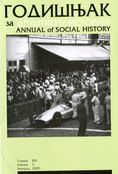Друштвени односи у Србији у време закаснелог капиталистичког развоја
Social relations in Serbia in the period of belated development of capitalism
Author(s): Mladen LazićSubject(s): Social Sciences
Published by: Udruženje za društvenu istoriju
Keywords: Serbia; modernization; state-centrism; capitalism; bourgeoisie; peasantry
Summary/Abstract: Analysis begins with the fact that in the mid-20th century in Yugoslavia a revolutionary (systematic) change was carried out: belated formative stage of the capitalistic system was replaced with collective ownership (socialist) type of social reproduction. The author analyses social relations in Serbia in 19th and 20th century, tracing continuity of supremacy of state over society. The analysis is based onrelation of uneducated ,,sea of peasants", military and ruling elite, and thin stratum of bourgeoisie. State-centrism was identified as a way of modernization of traditional society in Serbia, which paid severely high prices in human lifes and material possessions. The author identifies three basic elements of continuity of social (state and ideological) structures during 19th and 20th century in Serbia: 1. median social role of the state towards the owners of the small properties, which implies protecting them from capitalistic ways of differentiations and ,,proletarizations"; 3. egalitarian and authoritarion ideology. Therefore, it has been concluded that the whole structure was close to socialitic type of planned regulation. Permanent ,,exchange" with the peasantry, as well as symbiosis with the bourgeoisie and cultural elite, secured a central place in social hierarchy for political elite in Serbia, and made social organization state-centralized. Therefore, socialist regime in SFRY resembled top of that socio-historical development, but, at the same time, by its non-capitalistic modernization, managed to eradicate one of the basic factors of historical development -peasantry. For a few decades, communists managed to succed what capitalistic class in Serbia was not capable of achieving in a period of hundred years. A basic question of post-socialistic transformation is constituion of social groups relatively independent of the state aparatus - capitalistic class and middle class -which could limit influence of state apparatus and political elite on the frames of political subsystem.
Journal: Godišnjak za društvenu istoriju
- Issue Year: XVI/2009
- Issue No: 3
- Page Range: 7-41
- Page Count: 35
- Language: Serbian

